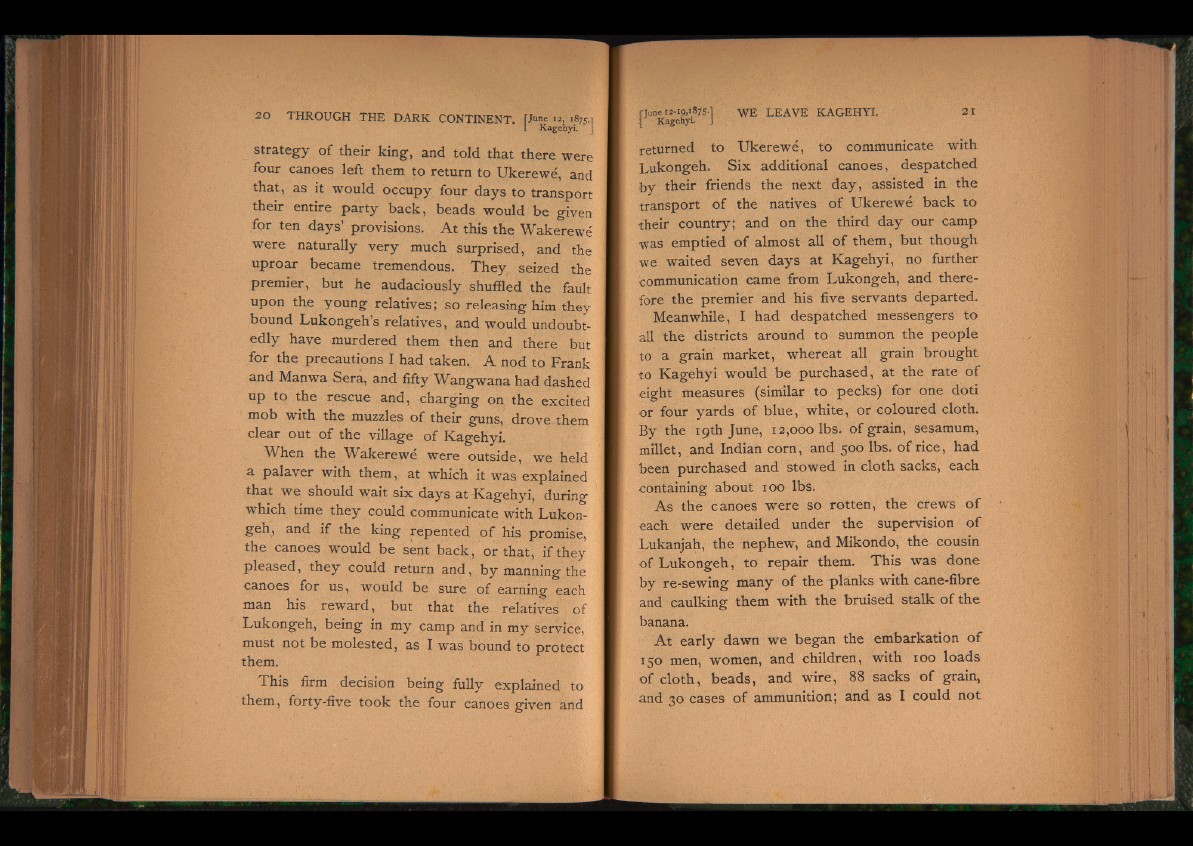
strategy o f their king, and told that there were
four canoes left them to return to Ukerewe, and
that, as it would occupy four days to transport
their entire party back, beads would be given
for ten d ay s ’ provisions. A t this the Wakerewe
were naturally v e ry much surprised, and the
uproar became tremendous. T h e y seized the
premier, but he audaciously shuffled the fault
upon the young relatives; so releasing him they
bound Lukongeh’s relatives, and would undoubted
ly have murdered them then and there but
for the precautions I had taken. A nod to Frank
and Manwa Sera, and fifty Wangwana had dashed
up to the rescue and, charging on the excited
mob with the muzzles o f their guns, drove., them
clear out o f the village o f Kagehyi.
When the Wakerewe were outside, we held
a palaver with them, at which it was explained
that we should wait s ix days at Kagehyi, during
which time th ey could communicate with Lukongeh,
and i f the king repented o f his promise,
the canoes would be sent back, or that, i f they
pleased, th ey could return and, b y manning the
canoes for us, would be sure o f earning each
man his reward , but that the relatives o f
Lukongeh, being in my camp and in my service,
must not be molested, as I was bound to protect
them.
This firm decision being fully explained to
them, forty-five to ok the four canoes given and
rJ an e 12-19.1875-1 WE LEAVE KAGEHYI. 2 1
1 Kagehyi. J
returned to Ukerewe, to communicate with
Lukongeh. S ix additional canoes, despatched
J by their friends the next d ay , assisted in the
transport o f the natives o f Ukerewe back to
their country; and on the third day our camp
was emptied o f almost all o f them, but though
we waited seven days at Kagehyi, no further
communication came from Lukongeh, and therefore
the premier and his five servants departed.
Meanwhile, I had despatched messengers to
all the districts around to summon the people
to a grain market, whereat all grain brought
to Ka g eh y i would be purchased, at the rate o f
eight measures (similar to pecks) for one doti
I or four yards o f blue, white, or coloured cloth.
By the 19th June, 12,000 lbs. o f grain, sesamum,
millet, and Indian corn, and 500 lbs. o f rice, had
been purchased and stowed in cloth sacks, each
I containing about 100 lbs.
A s the canoes were so rotten, the crews o f
I each were detailed under the supervision o f
I Lukanjah, the nephew, and Mikondo, the cousin
o f Lukongeh, to repair them. This was done
by re-sewing many o f the planks with cane-fibre
and caulking them with the bruised stalk o f the
banana.
A t early dawn we began the embarkation o f
150 men, women, and children, with 100 loads
o f clo th, beads, and wire, 88 sacks o f grain,
and 30 cases o f ammunition; and as I could not